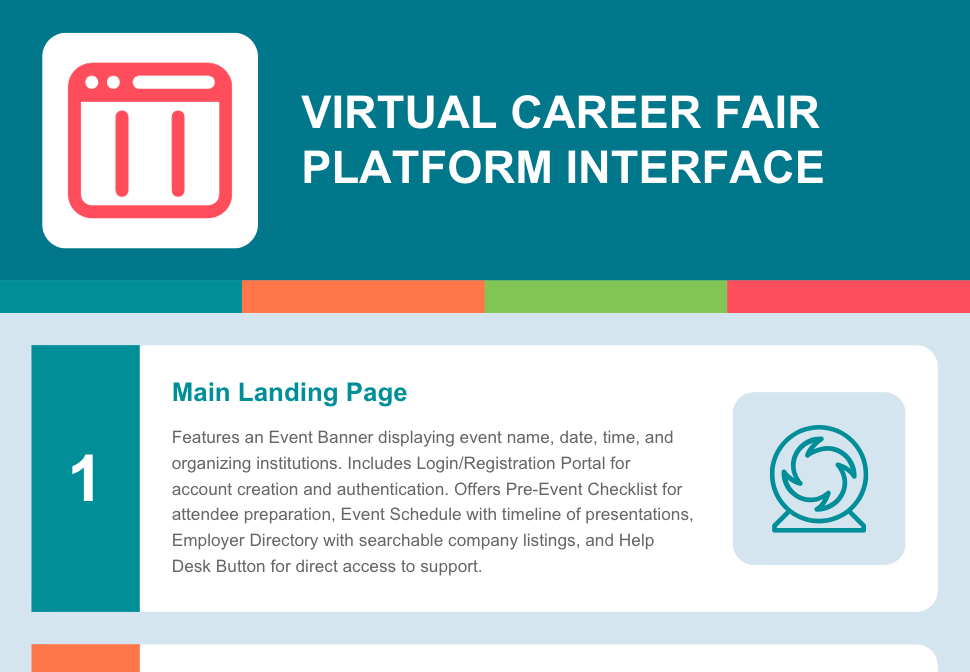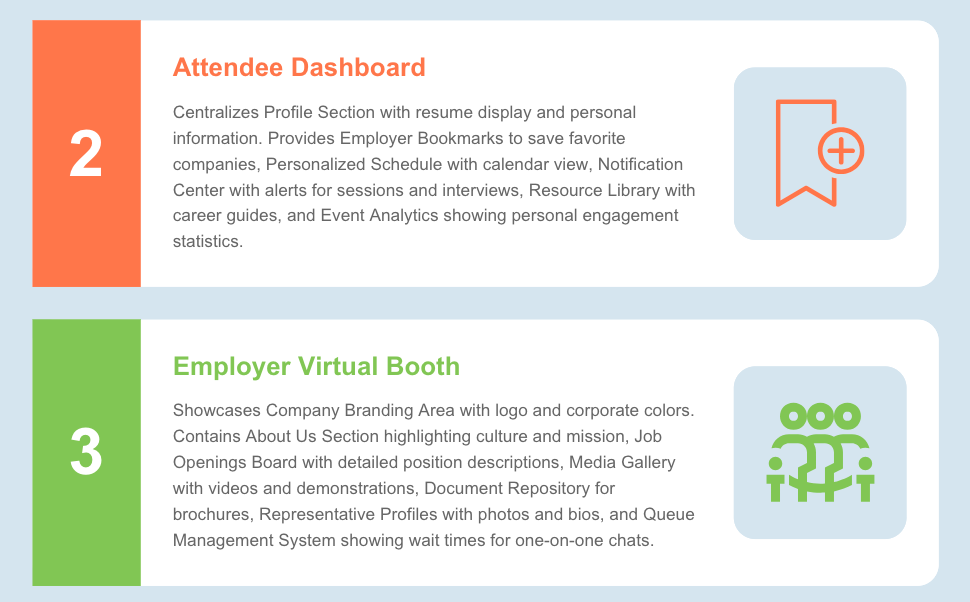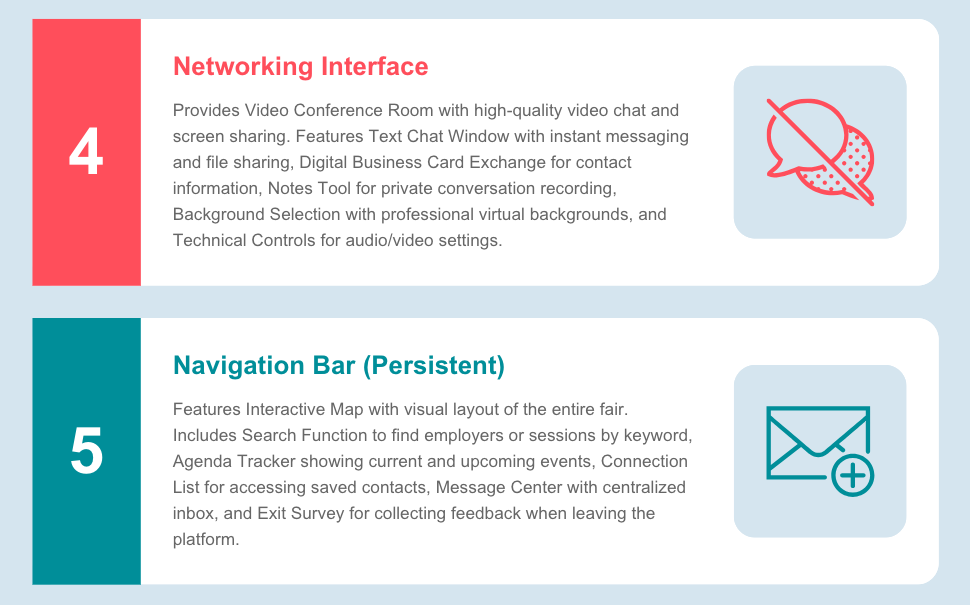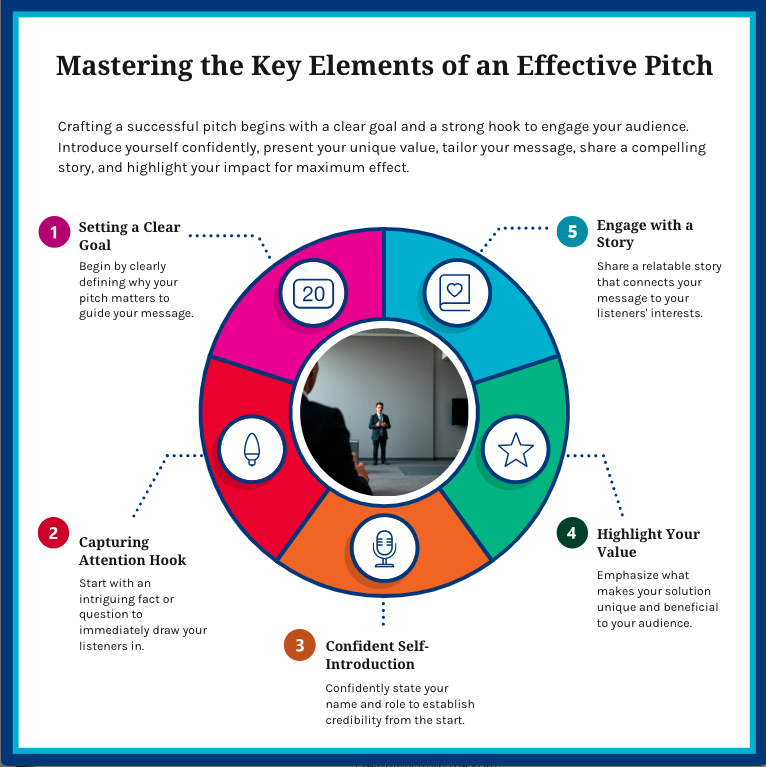The Ultimate Guide to Virtual Career Fairs: Preparation and Follow-up Strategies
Master virtual career fairs with our comprehensive guide covering preparation strategies, technical setup, and effective follow-up techniques. Learn how to make meaningful connections with recruiters online, optimize your digital presence, and stand out from other candidates. Discover expert tips for navigating virtual platforms, crafting the perfect elevator pitch, and turning online networking into job opportunities. Whether you're a recent graduate or seasoned professional, these proven strategies will help you maximize your next virtual hiring event.
J Matthew
5/15/20258 min read
The Ultimate Guide to Virtual Career Fairs: Preparation and Follow-up Strategies
In today's digital-first job market, virtual career fairs have transformed how job seekers connect with potential employers. These online events offer unprecedented access to opportunities regardless of geographic location, making them an essential tool in any modern job search strategy. With the right approach, virtual hiring events can be just as effective—if not more so—than their in-person counterparts for landing your next role.
Research shows that candidates who thoroughly prepare for online career fairs experience significantly higher success rates in securing interviews and job offers. This comprehensive guide will walk you through everything you need to know about maximizing these digital networking events, from pre-event preparation to post-fair follow-up strategies that get results.


Understanding Virtual Career Fair Platforms and Technology
Virtual job fairs operate through specialized online platforms designed to replicate the interactive nature of traditional career fairs. These digital environments connect employers and candidates through video conferencing, chat functions, and virtual exhibition spaces, creating opportunities for meaningful engagement despite the physical distance.
Most virtual recruitment events utilize user-friendly interfaces that allow participants to move between employer booths, attend presentations, and engage in one-on-one conversations with recruiters. The technology has evolved significantly in recent years, with many platforms now offering sophisticated features to enhance the experience for both employers and job seekers.
Key Features of Virtual Career Fair Platforms
Virtual job fair platforms typically include several interactive elements designed to facilitate productive connections:
Virtual lobbies with intuitive navigation to employer booths
One-on-one and group video conferencing capabilities
Text-based chat functions for initial introductions
Document sharing for resumes and portfolios
Information centers with job listings and company profiles
Networking lounges for informal discussions with recruiters
Webinar capabilities for company presentations and Q&A sessions
Navigating the Virtual Environment
Successful career fair participation requires familiarity with the specific platform being used. Take time before the event to:
Complete your profile with all relevant professional information
Upload an updated resume and portfolio materials
Test your camera, microphone, and internet connection
Review any platform tutorials or guides provided by organizers
Understand how to join waiting rooms for popular employers
Learn shortcuts for moving between different virtual spaces
Technical preparation is crucial—a stable internet connection, functioning audio/video equipment, and comfort with the platform will ensure you can focus on making a strong impression rather than troubleshooting technical issues during the event.








Pre-Event Preparation Strategies
The success of your virtual career fair experience depends largely on thorough preparation. Unlike physical events where spontaneous interactions might occur, virtual fairs require strategic planning to maximize your limited time with recruiters.
Researching Participating Employers
Before the event, carefully review the list of participating organizations and prioritize your targets.
For each company of interest:
Study their mission, values, and corporate culture
Research recent news, projects, and achievements
Identify open positions that match your qualifications
Understand their industry position and competitors
Review employee testimonials and company reviews
Prepare specific questions that demonstrate your knowledge
Career fair preparation should include creating a tiered list of employers—your "A" list for must-visit booths and a "B" list for secondary options if time permits. This targeted approach helps you manage your time efficiently during the event.
Optimizing Your Digital Presence
Your digital presence becomes your first impression in the virtual environment:
Update your resume with relevant keywords and quantifiable achievements
Create a polished LinkedIn profile that aligns with your resume
Prepare a professional headshot for your profile
Craft a concise but compelling personal introduction (30-second elevator pitch)
Develop a portfolio of work samples if applicable to your field
Ensure all digital materials reflect consistent personal branding
Remember that online job fairs often allow employers to review candidate profiles before and after the event, making your digital presence an ongoing opportunity to impress potential employers.
Creating Your Elevator Pitch
Develop a clear, concise introduction that communicates:
Your name and professional background
Educational credentials and relevant certifications
Key skills and areas of expertise
Career goals and specific interests
Why you're interested in the particular company
What unique value you can bring to their organization
Practice delivering your pitch naturally so it sounds conversational rather than rehearsed when you meet with recruiters during the virtual hiring event.


Technical Setup and Environment Preparation
The technical aspects of participating in virtual job fairs are just as important as your professional preparation. Creating the right environment and ensuring your technology works properly will help you make the best possible impression.
Technical Requirements
Ensure you have:
A reliable computer with updated software
Strong internet connection (consider using an ethernet cable instead of Wi-Fi)
Functioning webcam and microphone (test before the event)
Headphones to minimize background noise
Backup device in case of technical failures
Required platform applications or browser extensions installed
Creating a Professional Environment
Virtual career fair success depends partly on your physical environment:
Choose a quiet location free from distractions
Ensure proper lighting (facing a window or using a ring light)
Select a neutral, uncluttered background (or use an appropriate virtual background)
Position your camera at eye level for the most flattering angle
Have water and note-taking materials within reach
Keep your phone on silent but accessible for backup communications
A professional background and clear audio/video quality demonstrate your attention to detail and preparation—qualities employers value in potential candidates.


Effective Engagement Strategies During the Event
How you engage with recruiters during a virtual job fair can significantly impact your success. With limited time for each interaction, making a memorable impression is essential.
Starting Meaningful Conversations
When engaging with employers:
Begin with a friendly greeting and your prepared elevator pitch
Reference specific aspects of the company that interest you
Ask thoughtful questions about the company culture and available positions
Share relevant experiences that demonstrate your fit for their needs
Be concise but thorough in your communication
Express genuine enthusiasm for the organization and opportunities
Avoid generic questions that could be answered by visiting the company website. Instead, focus on insights only a current employee could provide.
Making the Most of Group Sessions
Many virtual recruitment events include webinars or group information sessions:
Join these sessions promptly to secure your spot
Come prepared with thoughtful questions
Actively participate in discussions and polls
Take notes on key information
Look for opportunities to stand out with insightful comments
These group sessions often provide valuable company information and culture insights that can inform your one-on-one conversations later. Just as you prepare thoughtful questions for career fair conversations, practicing through mock interviews can significantly improve your ability to communicate effectively with recruiters and make lasting impressions during these virtual interactions.
Managing Your Time Effectively
Time management is crucial during online career fairs:
Prioritize your most desired employers
Set calendar reminders for scheduled conversations
Allow buffer time between meetings for note-taking
Be punctual for all scheduled interactions
Have a strategy for quickly transitioning between virtual booths
Be flexible and ready to adjust your schedule as opportunities arise


Professional Presentation and Communication
Your verbal and non-verbal communication during virtual hiring events significantly impacts recruiters' impressions of you as a candidate.
Dressing for Success
Dress professionally from head to toe even if only your upper body is visible:
Choose industry-appropriate attire
Opt for solid colors rather than busy patterns
Ensure clothing is clean, pressed, and well-fitting
Select conservative accessories that don't distract
Groom yourself as you would for an in-person interview
Professional appearance signals your seriousness and respect for the opportunity to connect with employers.
Virtual Communication Etiquette
Effective communication in virtual environments requires:
Making appropriate eye contact by looking at the camera
Maintaining good posture throughout conversations
Using hand gestures naturally but sparingly
Speaking clearly and at a moderate pace
Demonstrating active listening through nodding and responsive expressions
Minimizing distracting movements or fidgeting
Remember that virtual interactions may feel less natural than in-person ones, so conscious attention to these communication elements is important.


Strategic Follow-Up After the Fair
Perhaps the most crucial element of career fair success is what happens after the event concludes. Strategic follow-up can set you apart from other candidates and keep you top-of-mind with recruiters.
Organizing Your Connections
Immediately after the fair:
Review and organize your notes from each conversation
Sort employer contacts by level of interest and potential fit
Document specific next steps discussed with each recruiter
Identify key points to reference in follow-up communications
Create a follow-up schedule to ensure timely outreach
Crafting Effective Follow-Up Communications
Within 24-48 hours after the event:
Send personalized thank-you emails to each recruiter you met
Reference specific conversation points to jog their memory
Reaffirm your interest in the position and organization
Attach your resume or portfolio if requested
Include any additional information promised during your conversation
Express enthusiasm for the next steps in the process
Virtual job fair follow-up communications should be concise, error-free, and professional while still conveying your authentic interest.
Maintaining Momentum in Your Job Search
After your initial follow-up:
Connect with recruiters on LinkedIn with a personalized message
Complete any formal applications as directed
Follow the company on social media to stay informed about news and developments
Set reminders to check in if you haven't heard back within the expected timeframe
Continue researching the company to prepare for potential interviews
Keep detailed records of all communications for future reference
Common Virtual Career Fair Challenges and Solutions
Even with thorough preparation, virtual career fairs can present unexpected challenges. Being prepared to address these issues will help you navigate them effectively.
Technical Difficulties
If you encounter technical problems:
Have a backup device ready to use if needed
Save recruiter contact information for direct outreach if disconnected
Prepare a brief apology statement for technical interruptions
Know how to quickly troubleshoot common issues (microphone access, camera activation)
Have the event's technical support contact information readily available
Standing Out in a Virtual Environment
To distinguish yourself from other candidates:
Ask insightful questions that demonstrate deep company research
Share brief, relevant stories that highlight your key achievements
Use specific examples that demonstrate your skills and experience
Follow up with thoughtful, personalized communications
Reference unique conversation points that will help recruiters remember you
Overcoming Virtual Communication Barriers
To establish rapport despite the digital medium:
Use a conversational tone while maintaining professionalism
Incorporate appropriate smiling and facial expressions
Listen attentively and avoid interrupting
Use the chat function to share additional information when appropriate
Express enthusiasm through your voice and engagement


Implementing Your Virtual Career Fair Strategy
Virtual career fairs offer unprecedented opportunities to connect with employers regardless of geographic limitations. By thoroughly preparing, creating a professional presentation, engaging effectively during the event, and following up strategically, you can leverage these online platforms to advance your career goals.
Remember that success at virtual hiring events doesn't always mean immediate job offers. Building meaningful connections, gathering valuable company information, and positioning yourself as a qualified candidate are all important outcomes that can lead to future opportunities.
The digital nature of these events creates both challenges and advantages—embrace the format by showcasing your technical adaptability, communication skills, and professional presence. With practice and refinement of your approach, virtual career fairs can become a powerful tool in your job search arsenal.
Ready to put these strategies into action? Mock interviews can help you refine your presentation and communication skills before your next virtual career fair. Our professional mock interview specialists provide personalized feedback and coaching to ensure you make the strongest possible impression with recruiters.
Sign up today at mockinterviewspecialist.com to practice your elevator pitch, prepare for common questions, and gain the confidence you need to stand out in your next virtual career fair.
Sources
vFairs.com. "Virtual Job Fairs: The Definitive Guide (2025)." https://www.vfairs.com/guides/what-are-virtual-job-fairs/
vFairs.com. "Virtual Career Fairs: The Ultimate Guide (2025)." https://www.vfairs.com/guides/the-ultimate-guide-to-virtual-career-fair/
Virginia Tech Career and Professional Development. "How to prepare for career fairs, both in-person and virtual." https://career.vt.edu/job-search/meet_employers/career-fair-prep.html
Handshake. "Attending a Virtual Career Fair? Here Are 10 Tips You Need to Know." https://joinhandshake.com/blog/students/attending-a-virtual-career-fair-here-are-10-tips-you-need-to-know/
FlexJobs. "Virtual Job Fairs: How to Find Online Job Leads." https://www.flexjobs.com/blog/post/how-prepare-for-a-virtual-job-fair-v2
The Muse. "How to Succeed at a Virtual Career Fair." https://www.themuse.com/advice/virtual-career-job-fair
CareerForce. "Virtual Career Fair Recruiting." https://www.careerforcemn.com/virtual-career-fair-recruiting
Mock Interview Specialist
"Tailored mock interviews for career growth success."
Want to receive helpful interview tips?
DBA Mock Interview Specialist - 2025 - All Rights Reserved



